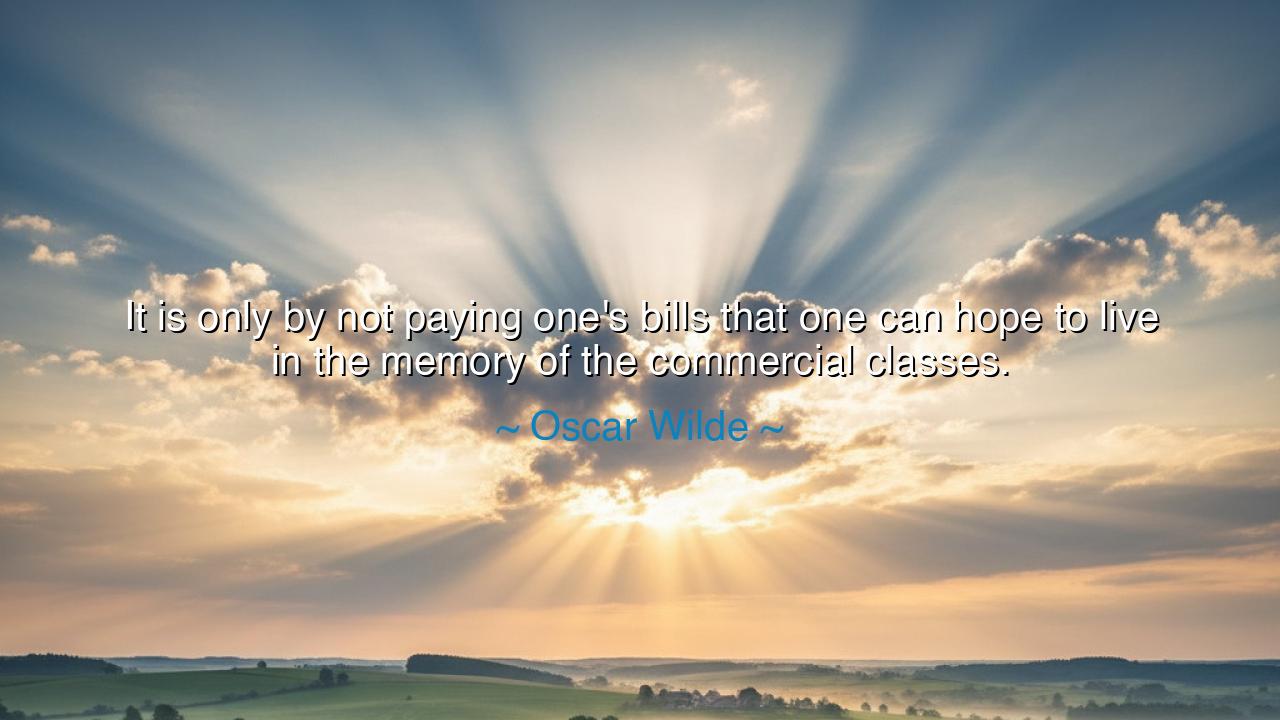
It is only by not paying one's bills that one can hope to live in
It is only by not paying one's bills that one can hope to live in the memory of the commercial classes.






In the brilliant and mischievous words of Oscar Wilde, master of wit and paradox, there lies a truth wrapped in humor, and a jest that cuts deeper than most solemn philosophies: “It is only by not paying one’s bills that one can hope to live in the memory of the commercial classes.” At first glance, the saying appears as a playful rebellion against convention — the laughter of a man too wise to be bound by the dullness of obligation. Yet beneath that laughter is the shadow of critique, a mirror held up to society itself. Wilde, with his characteristic grace and irony, reminds us that in a world obsessed with commerce, one’s value is too often measured by money owed, not by spirit given.
The origin of this quote reaches back to Wilde’s late Victorian England — an age where the glitter of progress concealed the hunger of materialism. The “commercial classes” were rising in power, turning the exchange of goods into the measure of civilization. Yet Wilde, ever the poet of beauty and truth, saw in this worship of commerce a profound emptiness. He was himself no stranger to debt, living extravagantly, often beyond his means, not because he sought wealth, but because he sought life — rich, beautiful, and full. In jesting about his unpaid bills, Wilde exposes the absurdity of a world that remembers men not for their ideas or their art, but for the balance of their accounts.
Beneath the laughter lies an ancient wisdom: that the memory of the soul and the memory of society are two different things. The merchant remembers the debtor; the spirit remembers the dreamer. The former lives in ledgers, the latter in hearts. Wilde’s irony teaches us that those who seek immortality in the books of bankers will never find it; but those who live freely, even scandalously, in pursuit of art, truth, or love — these are remembered long after their debts have turned to dust. To owe is temporary; to inspire is eternal.
Consider the fate of Wilde himself, whose life mirrors the truth of his words. He was condemned not only by the courts but by the very society he mocked — the same society that now venerates his genius. He died impoverished, a man of broken fortune but unbroken spirit. Yet today, the commercial classes that once sneered at him have long been forgotten, while his name endures in every corner of the world. The irony is perfect: Wilde’s unpaid debts may have scandalized the businessmen of his time, but his unpaid wisdom has enriched humanity for generations.
There is in this quote, too, a deeper philosophy of rebellion — a call to question what truly gives life meaning. Wilde teaches that to live only by convention, to measure worth by obedience to bills and balances, is to forfeit the poetry of existence. He does not literally advise carelessness, but fearlessness — the courage to place art, joy, and authenticity above the lifeless rules of economic respectability. He speaks, as the ancients once did, of a freedom that cannot be bought — the freedom of a soul that values beauty over barter, truth over transaction.
The humor of his statement is also a sword against hypocrisy. Society, Wilde knew, often forgives every sin except poverty. The “commercial classes” worship success and despise those who fail within their system, yet secretly envy the ones who live beyond it. By mocking them, Wilde reclaims power for the artist, the dreamer, the one who owes the world nothing but their own genius. His wit becomes a weapon — laughter as revolution, irony as shield. For what better way to expose folly than to make it ridiculous?
Thus, my children of this restless age, take Wilde’s wisdom not as license for neglect, but as a reminder of what truly endures. Pay your debts if you must, but do not live as though that is all there is to life. Seek instead to create, to love, to leave a mark upon the soul of the world — for that is a debt that no gold can settle. Be not remembered for your transactions, but for your transformations; not for what you owed, but for what you gave.
For in the end, Oscar Wilde teaches us this: that life is not a balance sheet but a symphony. To be remembered by the merchants is to be a debtor; to be remembered by humanity is to be an artist. So live beautifully, give generously, and let your legacy be not in coins, but in light. For it is better, perhaps, to die with unpaid bills than to live with an unpaid soul.






AAdministratorAdministrator
Welcome, honored guests. Please leave a comment, we will respond soon